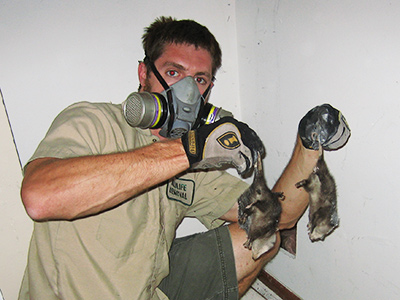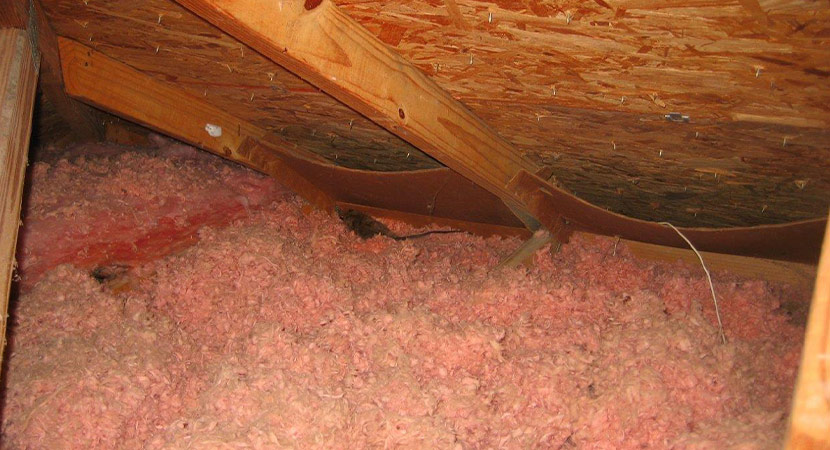Call me: 336-844-4305
Welcome to Greensboro Dead Animal Removal! Got a terrible smell in your house, or do you see a dead critter on your property? We are an animal control company specializing in the removal of dead animals from your home, attic, basement, walls, yard, or any part of your property. You clearly don't want a dead animal in your house. Carcasses attract flies and give off terrible smells, not to mention the potential diseases rotting flesh can cause. Whenever we remove dead animals, we use 100% safe methods and make sure to disinfect your home and get rid of all traces of odor. Click here for Free Roadkill Removal and click here for Dead Pet Body Removal. For deceased wild animals in your home or property, call us anytime at 336-844-4305 to schedule an appointment for today! We come out fast! Some of the services we offer include:
- Dead Animal Removal
- Foul Odor Diagnosis
- Full Property Inspections
- House Damage Repairs
- Dead Body Location Services
- Proper Carcass Disposal
- Cleanup & Decontamination Services
- Deodorization Services
CALL US ANYTIME AT 336-844-4305

Most wild animals that will make it inside your property will find it hard to make it out alive. If the animal is too young, being abandoned by their parents can reduce their survival rate. They can also acquire injury and illness. Eventually, they may die in the inconspicuous areas of the house. You may notice how there will be stains in your walls or ceilings, excessive bugs, or the unbearable decaying scent. Trying to remove the carcass on your own is never recommended due to the risks involved. Looking for the source can be challenging. The disposal of the dead body can turn into one giant mess. You can be exposing yourself to fines and legal claims unknowingly. Therefore, it is always essential to leave it at the hands of the professional. We are a family-owned and operated dead animal removal company committed to excellence and customer satisfaction. We have a team of professionals who will go above and beyond their duty to ensure that you will ultimately reclaim your property from them. We will not only handle the removal and disposal of the dead body but also sanitize and disinfect your property and keep your place smelling fresh. Call us today if you need more information about our service.
What Prices Do We Charge?
Learn about dead animal removal costs - each situation is different!
What if you found roadkill or a dead animal such as a deer in a public place, and you want the city or Guilford County services to remove it for free? Click here for Free Guilford County Dead Animal Removal services. What if a farm animal like a horse, or your beloved pet dog or pet cat has died and you need the body taken away? Click here for Dead Pet Body Removal.
We are experts in dead animal removal, and take our job seriously. When removing dead animals, we do a COMPLETE job — not only do we remove the dead animal from your home or yard, we also decontaminate the area, deodorize it, and dispose of the animal or cremate it. If you aren't sure whether the stench in your house is due to a rotting carcass or another reason, we can sniff it out with our noses from our years of experience. We remove dead raccoons, dead opossums, dead skunks, dead squirrels, dead birds, even dead dogs and cats. We frequently remove dead rodents from inside walls, because poison kills rats and mice, who die in your house. We completely solve your dead animal problem by taking these steps:
- Sniff out the dead animal if it is somewhere in your home
- When necessary, for example if the animal is in a wall or under your house, cut a hole to remove the animal
- Remove the dead animal, safely and completely (and seal the hole if needed)
- Finish the job by decontaminating and deodorizing your home
- Properly dispose of the dead animal through incineration or other means
- Prevent it from happening again by finding out how they got in your house
Dead animal carcass removal is specialty work. Sometimes the job is simple, such as a dead opossum in the yard, in which case we can simply wear our gloves and respirator mask, bag the carcass, and take it away for incineration. Sometimes this is more complex, such as when the dead animal is under a home crawlspace, under a porch or deck or shed. Or if the animal is larger, such as a dog or a deer. The most complex cases are dead animals inside the house. The animal may have died inside the attic, or down in the walls, or the duct work, or any other part of the architecture. You may have a bad smell in your home, and you're not even sure what's causing it. We've removed not just dead animals, but rotting food, bad mold, etc. We specialize in locating the source of the smell, and we very commonly cut a hole in the ceiling or wall to remove the animal. We remove every bit of the carcass, mop up the juices, vacuum the maggots, spray it and wipe it down with disinfectant, cleaner, and we repair the hole we cut. In some cases we use ozone machines to neutralize odor.
Greensboro Dead Animal Tip: How long does it take for a dead rat to start smelling, and then stop smelling?

Rats are common household pests that can infest properties and cause significant destruction. The critters can infest a property and die from numerous causes. When rats die, they decompose and produce a strong, unpleasant odor. The odor from decomposing rats can make an area unpleasant to live in. Rats specifically produce strong unpleasant odors. If dead rats are present on your property, you may be interested in knowing how long the smell will remain. Find out below.
How rats decompose
Rats decompose when the internal and external organisms begin to act on the tissues. The internal organisms are the microorganisms that normally occupy the intestine and other parts of the body.
Normally, the population of the internal organisms is controlled. The control mechanism is lost at death. The internal organisms that had beneficial effects begin to break down the tissues.
The decomposition of rats is also aided by insects such as blow flies, beetles, and flesh flies. For example, flesh flies and blowflies lay eggs on the carcass. The eggs hatch into larvae which specifically feed on the decaying carcass and enhance the rate of breakdown of the tissue. The larvae of the flies are the maggots that are found around carcasses. Organisms that feed on maggots could subsequently be attracted to the area.
Rat carcass decomposition is a multi-stage process. The stages of rat carcass decomposition are fresh, bloat, active decay, advanced decay, and dry remains.
The fresh stage of the decomposition occurs between three and six hours of death. Rigor mortis occurs and blood moves towards the part of the carcass that is in contact with the ground. This is when the internal organisms start the decay process. Blow flies and flesh flies are also attracted to the area.
During the bloat stage, the activity of the bacteria and maggots causes the production of gases. Fluids also move from the decomposing tissue to the body cavity to cause bloating. The pressure buildup within the body cavity causes the bloating. The next stage in the decay of the rat carcass is where the active decay occurs. The active decay causes the carcass to reduce in size. Maggots are mostly responsible for the active decay of the tissues of dead rats. After the active decay phase, the delayed decay of parts of the carcass occurs. During this stage, most of the flesh of the carcass has been destroyed. The components of the carcass remaining at this phase are the hairs and bones. The advanced decay stage leads to the dry remains stage. At this final stage, the only parts of the carcass remaining are the bones, cartilage, and skin.
The smell from dead carcasses is associated with the bloat, active decay, and delayed decay stages. The odor comes from the gases produced during the decomposition. The mix of gases produced from decaying rat carcasses includes sulfur dioxide, benzene derivatives, and different hydrocarbons.
The arrival of blow flies and flesh flies could be used to mark the beginning of the production of horrible odors from decaying rats. Blow flies can arrive a few hours after the death of the critters and infest for many weeks. The smell of dead rats could follow the same pattern: begin after a few hours and last for a few weeks.
sBecause of the unpleasantness of the smell of dead rats, deodorizing agents will be needed in making an area habitable while the odor continues. Deodorizing agents can be household products like vinegar, baking soda, and coffee grounds. Charcoal also absorbs odor and could be applied for deodorizing areas of dead rat smell. Deodorizing agents should be applied after the location of the carcass is identified, the carcass is removed, and the area is cleaned. The carcass should be removed in line with established safety measures. We highlighted the timeline of the smell of dead rats based on the stages of the decomposition process. It is noteworthy that the rate of decomposition could be influenced by different factors including the temperature, climate, and the location of the carcasses. The smell of dead rats in open spaces will not last as long as that of those in closed spaces, for example.
We service nearby towns such as Greensboro, Summerfield, Jamestown, Whitsett, Oak Ridge, McLeansville, Pleasant Garden, Stokesdale, Sedalia,.